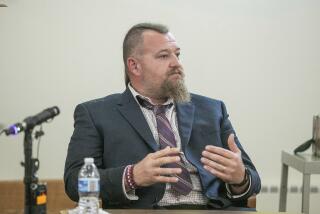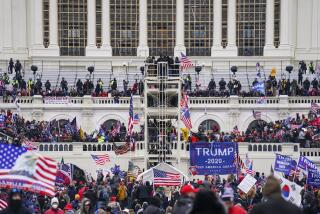Mistrial highlights anti-terrorism dilemma
- Share via
FORT LAUDERDALE, FLA. — The failure of federal prosecutors to convict any members of an alleged South Florida terrorist cell after two trials highlights the obstacles in a legal strategy of arresting terrorism suspects before they strike.
The preemption approach has been the Justice Department’s mandate since the attacks of Sept. 11, 2001.
But moving too quickly may have doomed the so-called Liberty City Seven case by leaving prosecutors without sufficient evidence to back up their allegations that the men wanted to launch a ground war against the U.S. government.
Violent rhetoric caught on tape from the group’s leader and a grainy video of the defendants swearing an oath of allegiance to Al Qaeda have not been enough to convince jurors the men were conspiring to join forces with the terrorist group and not, as defense lawyers argued, simply playing along in a scheme for money.
On Wednesday, U.S. District Judge Joan Lenard declared a mistrial after the second jury to consider the controversial case said it had become hopelessly deadlocked on charges that the men had plotted to bomb the Chicago Sears Tower and Miami FBI headquarters.
A trial ended in a mistrial Dec. 13 after jurors agreed to acquit one man but could not reach verdicts for the other six. Prosecutors have not indicated whether they will try the case a third time.
The outcome underscores a thorny question for law enforcement in preemptive cases: when to intervene.
“It’s a trade-off, and you want to make that trade-off in favor of public safety, which means arrests are often made before the point where it would be an optimal prosecution case,” said Kendall Coffey, a former U.S. attorney in Miami. “Most of the domestic terror trials have involved seeming wannabes because the government wants to intervene and arrest at the planning stage instead of the bombing stage.”
For the Liberty City defendants, the issue is muddied by evidence that the group was disbanding even as law enforcement moved in.
Bruce J. Winick, a law professor at the University of Miami, said that suggests officials had more interest in obtaining high-profile election-year indictments than in waiting to find out the group’s intentions.
“In this situation, it didn’t really seem that there was any imminent danger of anything,” Winick said. “If that’s the case, what’s the hurry?”
Narseal Batiste, 34; Patrick Abraham, 28; Rothschild Augustin, 24; Burson Augustin, 23; Naudimar Herrera, 24; Stanley Grant Phanor, 32; and Lyglenson Lemorin, 33, were arrested in June 2006 and charged with four conspiracy charges.
The first trial ended Dec. 13 with the acquittal of Lemorin.
In her closing argument in the second trial, prosecutor Jacqueline Arango told jurors that waiting to arrest the defendants was not an option.
“You don’t have to wait until people get shot or buildings go down to find people guilty of a conspiracy,” Arango said.
Despite that message, jurors in the first trial said some of them were not convinced the group was serious about carrying out attacks or even considering it before two paid informants arrived on the scene.
Miami resident Eldon Brown, a juror in the first trial who was dismissed before deliberations, put the jurors’ dilemma bluntly: “Some of the men might have wanted to do something,” Brown said. “But the fact is, they didn’t.”
Jurors in the recent trial, whose names have been kept secret, declined to comment. But they gave a clue into their efforts -- and their desire for more clear-cut evidence -- when they asked whether swearing an oath of allegiance to Al Qaeda should in itself be considered a crime.
Lenard told jurors that was for them to decide.
The government wins far more terrorism cases than it loses. In 2002, a Pakistani student at Broward Community College pleaded guilty to a conspiracy charge based on his discussions with an FBI informant who had infiltrated his Pembroke Pines mosque. No attacks were launched, and no weapons were obtained in the investigation, which predated the Sept. 11 attacks.
Still, the struggle of two juries to resolve the Liberty City case could signal problems for pending preemptive prosecutions,.
Giving a speech at a London think tank April 7, FBI Director Robert Mueller III said the agency’s mission was to “disrupt” plots as soon as possible, not to wait “until just before it is executed.”
Carl Tobias, a law professor at the University of Richmond, said that approach could cost the government convictions, adding that “may not be the worst thing in the world.”
“In some cases the government may move too quickly to secure the evidence it needs to prove specific charges beyond a reasonable doubt,” Tobias said. “Maybe it’s better to stop something you think is going to materialize before it does, and the price may be that we have prosecutions that fail.”
More to Read
Sign up for Essential California
The most important California stories and recommendations in your inbox every morning.
You may occasionally receive promotional content from the Los Angeles Times.













